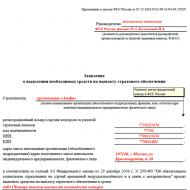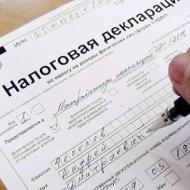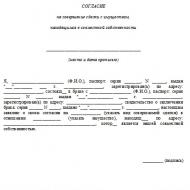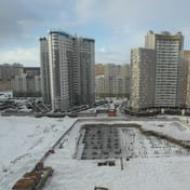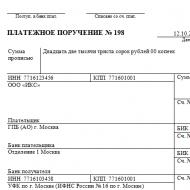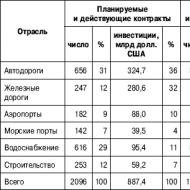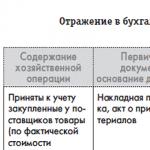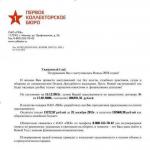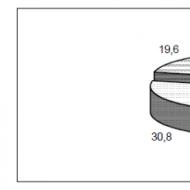
New presidential decree on the birth of a child. Additional measures to increase the birth rate. Housing for large families
The head of state announced a large-scale reform demographic policy. New measures will help those who do not have enough money to decide to expand their family. And they will start working in 2018. Payments for the birth of the first child are being introduced, the maternity capital program is being extended, the possibility of using its funds is expanding, and a special mortgage loan program will appear. And there will also be no queues at nurseries and clinics.
“We need active work to both reduce mortality and stimulate the birth rate,” Vladimir Putin said at a meeting of the Presidential Coordination Council for the implementation of the national strategy of action in the interests of children for 2012-2017. “Children are the future of Russia,” he emphasized.
"We need to reset our politics. demographic development"- the president continued. - In the foreground to support the stimulation of the birth rate are large families with modest income, as well as creating additional incentives for the birth of second and third children. “Special attention goes to young families,” he said. Most often, their income is very small and this often hinders the birth of children.
“The measures were discussed for a long time and the time has come to make a decision and announce,” the head of state said. New measures to support Russian families will begin on January 1, 2018.
First: a monthly cash payment will appear at the birth of the first child and until he reaches 1.5 years of age. The amount will be calculated from living wage child in the region for the 2nd quarter of the previous year of application for the specified payment. On average, in 2018 the amount will be 10,532 rubles, in 2019 - 10,836 rubles, in 2020 - 11,143 rubles. The payment will be targeted, taking into account family incomes - it will be received by those whose earnings are no more than one and a half times the subsistence level working population in the region. Expenditures on this program over three years will amount to 144.5 billion rubles.
The second is maternal capital. 11 years have passed since the introduction of this measure and the project was supposed to be completed at the end of next year. But people ask what will happen next, Putin noted and announced: it was decided to extend the program until December 31, 2021.
In fact, we need to reboot our demographic development policy
And that's not all: there will be additional features use of maternal capital. Those in particular need will be able to receive funds in the form of monthly payments. That is, the approach here is the same, targeted. And parents will continue to receive funds until the child is one and a half years old. It will be possible to use maternity capital to pay for the services of kindergartens and nurseries - as early as 2 months. “Mom will be able to continue working or studying,” Putin noted.
It has already been announced that the number of regions that receive co-financing from federal budget to pay benefits for the third child. This benefit is provided until the child turns three years old. The criteria for need are set by the regions. Co-financing goes where there is unfavorable demographic situation And total coefficient The birth rate is below the Russian average. This year, 50 regions benefited from co-financing. And from 2018, 60 regions will be able to receive it, those where two or fewer children are born, that is, the regional birth rate is increasing.
Another measure that is extremely important for young families is housing. Putin announced the launch of a special mortgage loan program. From January 1, 2018, subsidies will be provided interest rate in excess of 6 percent for three years from the date of issuance of the loan for the second child and five years for the third. This applies to both purchases on the primary market and refinancing of previously obtained loans. The measure will be able to cover over 500 thousand families in five years, the president said. Moreover, if the program is coming to an end and the child has just been born, the period for providing subsidies will be extended.
Another problem is the queues at the nurseries. In kindergartens they have practically been eliminated. Now we need to do the same for the little ones. Over 326 thousand places need to be created in two years.
It is necessary to increase the availability and improve the quality of medical care, the head of state said. There was a good breakthrough in the creation of perinatal centers, but in children's clinics there are big problems both with equipment and with queues. This is a deterrent when deciding to have a child, the president believes.
We are talking about the future of the country, about ensuring that as many children as possible are born in Russia and that their living conditions improve
More than 50 billion rubles will be required to reconstruct children's clinics and equip them. The regions will not be able to do this at their own expense, Putin noted. Therefore, for three years, the bulk of the amount - 10 billion rubles per year - will be provided by the federal budget. The head of state instructed the government and regions to quickly work out a detailed schedule for reconstruction and major repairs, approve the terms of co-financing and select clinics.
“We are talking about the future of the country, so that as many children as possible are born in Russia and so that living conditions improve,” the president concluded. His speech was greeted with applause in the hall.
Federation Council Speaker Valentina Matvienko thanked the head of state for his personal attention to this problem. “I’m shocked in a good way by what I heard: these are not some cosmetic offers!” - she said.
The national strategy in the interests of children made it possible to consolidate efforts around this topic, said the speaker of the Federation Council. For the first time, the state has addressed the issue of childhood in such a “large-scale, systematic and firm” manner, and much has already been decided.
“I’m sure next year will be a record year in terms of the birth of children,” Matvienko expects. "Children's" budget expenses are growing from year to year, she said. It was possible to halve the number of orphans in orphanages and on special registration; there is nothing like this in the world, the chairman of the Federation Council added.
The child population of our country has grown by 3 million in five years, Deputy Prime Minister Olga Golodets calculated. But not all regions are ready to implement the measures indicated by the president, she noted. For example, for benefits for a third child - Perm region did not include such a benefit in his budget, the deputy chairman of the government was indignant. There are seven regions where the problem of queues in kindergartens has not been resolved, Golodets also said. And Crimea comes first here. However, the situation should be resolved in the next three years.
At the meeting, the results of the implementation of the National Strategy for Action in the Interests of Children were summed up. It was designed for five years. “The strategy has truly acquired an all-Russian and national character, and, of course, it could not have been any other way, since we are talking about children, about the future of Russia,” Putin said. “In general, the results are very worthy and positive,” he assessed. This year, the president announced the beginning of the Decade of Childhood, and yesterday he supported the idea of creating a body to monitor the implementation of the project: Matvienko will do this work. Putin also agreed with the proposal to soften criminal legislation regarding juvenile offenders for a number of crimes. And speaking about issues of juvenile justice, he emphasized that it is unacceptable to infringe on the interests of parents. "We have our own traditions of a strong family, and this shameless interference in family life unacceptable," he concluded.
Talent of love
Having announced new steps to improve the demographic situation in the country, Vladimir Putin met in the Kremlin over a cup of tea with the winners of the All-Russian Family of the Year competition. This year, 322 families from 85 regions took part in it.
The competition is being held for the second year, but the number of participants has increased sharply, the president noted. “The family is the basis of our entire society, our entire state, but it’s not so much about that. It’s primarily about the human component. We all love children, we understand that this is our future, but not everyone can organize the work correctly, organize this work correctly work in families,” he said. “In the family, of course, everything happens, as everywhere else, but the talent is precisely the talent of people who manage to overcome all difficulties, and manage to overcome them, if not easily, then on the basis of kindness and love. to a friend, this talent is very valuable, just like the talent to create an atmosphere of warmth, kindness, and mutual support.” “You have succeeded, for which I first of all congratulate you,” Putin added.
The head of state said that a whole package of programs has been prepared to support families with children. And it turned out that he anticipated with them the questions that were asked at the meeting, and many of the requests made there.
A treat was prepared for the table: wild berries, crumbly cookies, macaroons and even candy, for some reason on a fork. But after the president's opening remarks, the participants were slightly confused - many did not dare to touch the dishes. Then the president encouraged them. “The candy sticks out deliciously on the fork,” he smiled, “people think whether they can start or not, they can!”
Infographics "RG": Leonid Kuleshov/Anton Perepletchikov/Alexander Smirnov/Alexandra Beluza
The families were from a variety of regions, including new ones. The President promised to create a modern museum complex with branches of leading museums in Sevastopol. “I recently spoke about Vladivostok, where the Hermitage and the Russian Museum are planning to open their branches. For this, we have created a separate modern museum complex. I think the same can be done for Sevastopol. And we will definitely do it,” he promised. In general, we should think about building modern cultural facilities in Sevastopol, Putin believes. We need a good musical theater and a base for training theater workers.
“We would build even more, we are ready to allocate as much money as necessary in order to achieve at least the Russian average and higher levels. The question is the capacity of the construction complex that operates in Crimea,” the president responded to the laureates’ gratitude for the development of the peninsula. “To be honest, I don’t really want to involve outsiders en masse... I would like local residents and local companies to work, but their capacity is still limited,” he added.
One of the invitees, an international master of sports in archery, spoke about the organization of children's competitions in this sport. “There is still a lot that needs to be done to support archery in general,” said the head of state. “We will do this gradually, especially since we have good results in this sport, it needs to be supported.”
Putin also appreciated the poem about his hard work: it was read right at the meeting by a poet, a father of many children from Sakhalin. The title of the work is: “I don’t envy you, Mr. President.” "Keep writing poetry!" - assessed the head of state. “There is nothing more interesting than doing something with love,” he praised the family’s many talents.
Yesterday, the New Year's wish of a family from Ingushetia came true ahead of schedule. The little twins wrote to Santa Claus - they would like to shake the president's hand. It came true. “We’ll do it now,” he responded to the boys’ request. But another child was not so lucky: he dreamed so much that his family would win the competition, he wanted to see the head of state so much that, having learned that everyone was going to the Kremlin, he fell ill from excitement and stayed home with a high fever. The President wished him health.
Vladimir Putin called the worsening demographic situation in the Russian Federation a predictable trend. “I mean the recession during the Great Patriotic War, and approximately the same decline in the mid-90s due to the huge problems that arose in the economy, and, in fact, the collapse of social sphere", the president explained.
During the Coordination Council for the implementation of the national strategy of action in the interests of children, the Russian leader called for “taking a set of measures that will stabilize and prevent a decline in the population of Russia in the coming decade” actually reboot demographic policy.
According to the president, the priority is to support large families, as well as families with modest incomes, and create additional incentives for the birth of a second and third child. Putin called for special attention to be paid to young families.
Thus, the president proposes to introduce, starting in 2018, monthly payments to young families at the birth of their first child until he reaches one and a half years old. The amount will be calculated from the child’s subsistence level established in the region.
Vladimir Putin, President of the Russian Federation: “On average it will be 10,523 rubles in 2018, in the 19th year 10,836 rubles, in the 20th year 11,143 rubles. In this case, the payment will be targeted. I think it’s only fair to support those who really need it first.”
In addition, in Russia they can extend the maternity capital program until December 31, 2021, as well as expand the scope of its application. Maternity capital can also be used to pay for preschool education services for the care and supervision of a child from the age of two months. Families in particular need can begin to receive monthly payments from the maternity capital account, Putin emphasized.
Putin announced the preparation of a special mortgage program for families with a second or third child; they will be able to count on government subsidized interest rates in excess of 6% per annum. Families in which a second or third child is born since January 1, 2018 will be able to take advantage of the opportunities of such a program.
The Russian leader also demanded the elimination of queues for nurseries for children from 2 months to 3 years, similar to the measures taken in relation to kindergartens. “Currently, applications have been received from parents of more than 326 thousand children. The same number of nursery places is planned to be created in the next two years,” said the President of the Russian Federation.
Separately, the president noted the problem with the quality of children's medical care. He noted that in last years A “good leap” has been made in creating perinatal centers in the regions, but the condition of the majority of children's clinics leaves much to be desired. And he demanded that this issue be worked out. In the next three years, the federal budget will annually allocate 10 billion rubles to the regions of the Russian Federation for the reconstruction and equipment of children's clinics, the Russian leader said.
According to the head of state, the implementation of the measures he proposed to improve the birth rate in the country will yield results.
Vladimir Putin: “We are talking about the future of the country, about ensuring that as many children as possible are born in Russia, and that their living conditions improve and medical care improves.”
The demographic situation in Russia is worsening again
"Today, mainly due to objective reasons“, the demographic situation in Russia is worsening again,” Putin noted at a meeting of the Coordination Council for the implementation of a national strategy in the interests of children.
“This trend was predictable and associated with the consequences of previous, overlapping deep demographic declines. I mean the decline during the Great Patriotic War (1943-1944) and approximately the same decline in the mid-1990s due to huge problems that have arisen in the economy, and, in fact, collapse in the social sphere,” the president emphasized.
The authorities will take measures to prevent population decline
“We need to take a set of measures that will stabilize and prevent a decline in Russia’s population in the coming decade. This requires active and consistent work in all areas: reducing mortality and stimulating the birth rate. In fact, we need to reset our demographic development policy.” , - said the head of state.
As for the birth rate, support for large families, families with modest incomes, and the creation of additional incentives for the birth of a second and third child come to the fore.
"It is also necessary to pay Special attention young families. These are, as a rule, families with low incomes. These are young people who are either still studying or have just entered the workforce, and their incomes are usually very modest. And this often holds back the birth of the first child, the appearance of the first child,” Putin said.
The maternity capital program will be extended until 2022.
“I propose to extend the maternity capital program until December 31, 2021. In addition, introduce additional opportunities for its use,” the president emphasized.
Maternity capital funds should be allowed to be received in the form of monthly payments to those families who are especially in need. “The same targeted approach will apply here as with payments for the first child. That is, payments will be determined in the amount of the child’s subsistence level in the region. And for families with incomes that do not exceed one and a half times the subsistence level of the working-age population,” Putin said .
Maternity capital will be allowed to be used to pay for preschool education services, care and supervision of a child from the age of two months. “I know that this measure is in great demand, in particular, after the birth of a child, a mother will be able to continue working or studying,” the president noted.
Russia will introduce a monthly payment at the birth of the first child
“To support the birth rate, I propose to begin implementing a number of new measures to support Russian families starting in January 2018. Establish a monthly cash payment, which will be provided at the birth of the first child and paid until he reaches one and a half years old,” Putin said.
The amount of payments will be determined based on the child’s subsistence level established in the subject of the Federation. “On average, it will amount to 10,523 rubles in 2018, 10,836 rubles in 2019, and 11,143 rubles in 2020. Moreover, the payment will be targeted,” the head of state emphasized.
Family income must be taken into account. “And I think this is fair: first of all, to support those who really need it,” Putin explained and added that the amount of payments “will be determined in the amount of the subsistence minimum for children established in the subject of the Federation for the second quarter of the previous year of application for this payment ".
Payments under the program aimed at supporting families at the birth of their first child will amount to 144.5 billion rubles. for three years.
Families with a second and third child will receive mortgage benefits
"I propose to launch special program mortgage lending. Families in which a second or third child is born since January 1, 2018 will be able to take advantage of its opportunities. Buying housing on the primary market or refinancing previously received mortgage loans, families will be able to count on state subsidies for interest rates in excess of 6% per annum,” Putin said.
According to the Central Bank, the average mortgage rate is 10.5%. If a family with a second or third child takes at this rate, then the state will help with the payment of 4.5%, and the family will remain 6%. “That is, in this case, the state takes on more than 4% of the cost of the loan. According to the Ministry of Construction, in the next five years this program can cover over 500 thousand families,” Putin explained.
The authorities will repair old and build new children's clinics
“The government, together with the regions, needs to quickly work out a detailed schedule for reconstruction and overhaul children's clinics, including outpatient departments of hospitals," the president said. The government must approve the conditions for co-financing hospitals and the rules for selecting clinics. "This should be done taking into account the readiness design and estimate documentation and, above all, the severity of the problem,” the head of state noted and added that such a measure would improve medical care for children.
Authorities will eliminate queues at nurseries and kindergartens
Putin has set the task of eliminating queues at nurseries. “We have practically solved the problem with places in kindergartens. Now we need to eliminate queues in nurseries for children from two months to three years old. And this needs to be done as quickly as possible. Now applications have been received from the parents of more than 326 thousand children. The same number of nursery places planned to be created in the next two years," the president said.
Vladimir Putin, who has not yet announced his presidential candidacy, has already promised gifts to the population. Starting in 2018, families with children will receive new benefits, a mortgage subsidy program, and maternity capital will be extended. The price of gifts is more than 200 billion rubles. The money has already been included in the draft budget for 2018–2020. - in the presidential reserve.
The measures should stimulate the birth rate, Putin explained. After the baby boom of 2000, it began to fall: in January - September 2017, it practically did not grow in annual terms, and the natural population decline exceeded 100,000 people against the natural increase for the same period in 2016 by 18,000 people.
Money for the firstborn
From 2018, families giving birth to their first child will receive a monthly subsistence minimum for the child until he turns one and a half years old. This minimum is different for each region, but on average in 2018–2020. will exceed 10,000 rubles. The assistance will be targeted - only poor families will be able to count on benefits. In total, the government will spend more than 144 billion rubles on this.
It is unclear who should be considered poor, a federal official admits: without a system unified register people and households are unclear about the real structure and level of poverty. You can do without a register, argues Tatyana Maleva, director of the Institute of Social Analysis and Forecasting of RANEPA: we are talking about people who do not have enough money for current consumption. If a family's income is less than 1.5 times the poverty level, it can get into the program, she says. In the first half of 2017, 14.4% of the total population had incomes below the subsistence level.
People are already receiving benefits for caring for their first child up to one and a half years old. But in the second quarter of 2017 it was slightly above 3,000 rubles. The new allowance can become a serious measure of support, Maleva believes: many people even receive wages below the subsistence level, and families cannot decide, let alone a second or third child, or even a first. The number of families with two or three children is growing faster than families without them, she says. For a family in the region that is on the verge of poverty, this is a great help, agrees another federal official.
Capital for drinking?
Another measure is the extension of the maternity capital program until the end of 2021 (previously it was supposed to end at the end of 2018). The purposes for which such money can be spent will also expand: families in particular need will be able to receive monthly payments (the same amount as the new benefits for the first child) until the child turns one and a half years old. Capital can also be spent on nannies caring for children.
The measure could turn the program into a new benefit, the official is skeptical, but it will not be spent on children, but on alcohol. Now, of the three possible goals - education of the child, improvement living conditions or replenishing the funded part of the mother’s pension - most often the money is spent on housing. But not every family needs it and can afford it, argues Maleva: with the crisis, incomes fall and many do not even have enough money for food. " Individual families They really can drink away their capital, but what, 146 million people here are alcoholics?” she says, wondering why everyone has to suffer because of troubled families. Many people have been asking for permission to spend money on nurseries for a long time, says Maleva; however, without the construction of new nurseries, the measure may not work, she warns.
Mortgage at 6%
Modernization for children
50 billion rubles. will be allocated for the reconstruction and re-equipment of children's clinics. The situation with hospitals is already almost critical: 31% of hospitals and clinics do not have running water, 35.5% do not have sewerage, 40.5% do not have central heating, according to data from the Accounts Chamber. According to her calculations, after 13 years without allocating money for renovation, more than 70% medical equipment it will be impossible to use
For wealthier families, the government will revive the mortgage subsidy program. For those who will have a second and third child in 2018, a program will be launched to subsidize the mortgage interest rate. When buying a home on the primary market or refinancing mortgage loans they will be able to count on subsidized rates in excess of 6% per annum for three years from the date of issuance of the loan at the birth of the second child and five years for the third. Now the average mortgage rate is 10.5%, as follows from the Central Bank data, so the state will bear more than 4% of the cost of the loan. In 2018–2023 the program could cover over 500,000 families, Putin cited an estimate from the Ministry of Construction. The cost of the program is 10 billion rubles, says the official.
In 2015–2016 a subsidy program was already in place at 12% per annum (the state compensated the borrower for the difference between this amount and the bank’s rate). Anyone could use it, but only for an apartment in a new building. The share of loans issued with its help exceeded 35% banking system, recalls Vadim Pakhalenko, director of the mortgage lending directorate at TKB Bank. But the new program will have a smaller audience, he believes, and the number of loans to such families will not exceed 7–8%. Banks will be able to increase client base, Pakhalenko hopes, but the main limitation of the use of subsidies is the cost of real estate.
On November 28, 2017, Vladimir Putin held a meeting of the Coordination Council for the implementation of the National Strategy for Children in the Kremlin, during which he made several long-awaited statements regarding new measures social support families with children who will earn money starting January 2018.
In total, the President proposed 6 new social support measures:
Attention
More details about all these proposals can be found in the transcript of the meeting published on the Kremlin’s official website. Below are the main excerpts from this speech by Vladimir Putin.
Opening speech of the President November 28, 2017
Vladimir Putin at the meeting of the Coordination Council for the implementation of the National Strategy of Action for Children:
“You know that this year, in accordance with the Decree Decade of Childhood announced. I hope that the Government, in implementing this new project, will certainly ensure continuity with the objectives of the National Strategy for Action in the Interests of Children, and the Federation Council will continue to keep these issues in the area of its constant attention. At the same time, I would especially emphasize that the importance of such areas as strengthening the institution of family and creating equal opportunities for the full development of all children remains the most important for us.
You know that since the beginning of the 2000s we have been closely and consistently engaged in demographic development issues. And thanks to thoughtful and, one might say, effective solutions, problems in this area are being consistently solved. Among the measures that were introduced and which are still working, the maternity capital program played a special role. Much has already been done in this regard; the birth rate has begun to rise. Having two children in a family has become a stable trend. Infant mortality decreased, thanks to the creation of a system of perinatal centers, first of all, it was possible to achieve positive indicators of natural population growth, which, frankly speaking, no one expected, but it happened.”
“Today we need to take a set of measures that will stabilize and prevent a decline in Russia’s population in the coming decade. This requires active, consistent work in all areas - both to reduce mortality and to stimulate the birth rate. In fact, we need reboot our demographic development policy».“As for the birth rate, it comes to the fore support for large families, families with modest incomes, creating additional incentives for the birth of a second and third child.
It is also necessary to pay special attention young families. These, as a rule, are families with low incomes, because these are young people who are either still studying or have just entered the workforce; their incomes are usually very modest. This often holds back the birth of the first child, the appearance of the first child.”
What measures have been proposed by the President since 2018?
Vladimir Putin:“We have, frankly, discussed various measures for quite a long time, the time has come to make a decision and announce these proposed new measures. To support the birth rate, I propose to begin implementing a number of new measures to support Russian families as early as January 2018:
Namely, funds from maternity capital can be received in the form of monthly payments to those families who are especially in need. The same targeted approach will apply here as with payments for the first child. That is, payments will be determined in the amount of the subsistence minimum for a child in the region and for families with incomes that do not exceed one and a half times the subsistence minimum for the working population. Also until the child reaches one and a half years old.
In addition, it will now be possible to use maternity capital to pay for preschool education services (or rather, for child care and supervision) from the age of two months. I know that this measure is in great demand. In particular, the mother will be able to continue working or education after the birth of the child.
- Third direction. As you know, a decision has already been announced to expand the number of regions that will receive co-financing from the federal budget to pay benefits for the third child. Such benefits have been paid since 2013. Children under three years of age are eligible. The criteria for the need of families, as well as the procedure for assigning payments, are established by the legislation of the subjects Russian Federation.
At the same time, let me remind you that co-financing from the federal budget goes to those regions where there is an unfavorable demographic situation and the total fertility rate is below the Russian average. IN this year 50 regions of the Russian Federation took advantage of such co-financing conditions.
From January 1, 2018, 60 constituent entities of the Russian Federation will be able to receive support. Those regions where, on average, one woman gives birth to two or fewer children will be able to receive it, that is, the regional birth rate increases to two. As I already said, such a change in the coefficient will make it possible for 60 regions to receive federal assistance to pay benefits for the third child.
- Fourth. The housing issue is extremely important, especially for young families and families with children in general. I propose to launch a special mortgage lending program. Families in which a second or third child is born since January 1, 2018 will be able to take advantage of its opportunities. By purchasing housing on the primary market or refinancing previously obtained mortgage loans, families will be able to count on government subsidized interest rates in excess of 6 percent per annum. Let me explain, for example, today the weighted average rate in the mortgage lending market is, according to the Bank of Russia, 10.05 percent. That is, in this case, the state takes on more than 4 percent of the cost of the loan. According to the Ministry of Construction, in the next five years this program could cover over 500 thousand families.
I'll tell you more. The mortgage lending program will be urgent in nature, providing for subsidizing the interest rate in excess of 6 percent upon the birth of a second child - for 3 years from the date of issuance of the loan; third child - within 5 years from the date the loan was issued. Questions may arise: the program will be coming to an end, and the child has just been born, what in this case. In the event of the birth of a third child during the subsidy period, but no later than December 31, 2022 inclusive, the subsidy period will be extended by 5 years - from the expiration date of the subsidy for the loan received in connection with the birth of the second child. In the event of the birth of a third child after the expiration of the subsidy period for the loan received in connection with the birth of the second child, but no later than December 31, 2022 inclusive, the provision of the subsidy is renewed starting from the date of birth of the third child.
- Fifth. We have practically solved the problem with places in kindergartens. Now we need to eliminate queues in nurseries - for children from two months to three years. This needs to be done as quickly as possible. Currently, applications have been received from parents of more than 326 thousand children. The same number of nursery places is planned to be created in the next two years.
- Sixth. We need to substantively and consistently improve the accessibility of medical care for children and, of course, improve its quality. I have already said several times that in recent years a good leap has been made to create perinatal centers in the regions. However, the condition of most children's clinics and their equipment leaves much to be desired. There are problems with queues and making an appointment with the right specialist. This state of affairs also serves as a deterrent when deciding to have children. And in general it just needs to be corrected and improved.
In order to reconstruct children's clinics, overhaul them and equip them with equipment, according to preliminary calculations, more than 50 billion rubles will be required. It is obvious that the regions, taking into account even the assistance that we have provided them recently, will not be able to complete this work at their own expense. Therefore, in the next three years, the bulk of this amount - 10 billion per year - will be provided by the federal budget.
The government, together with the regions, needs to quickly work out a detailed schedule for the reconstruction and overhaul of children’s clinics, including outpatient departments of hospitals, as well as approve the terms of co-financing and the rules for selecting clinics, to do this taking into account the readiness of design estimates and, above all, the severity of the problem.”
“I am confident that the implementation of all the proposed measures will bring results. I repeat, we are talking about the future of the country, about ensuring that as many children as possible are born in Russia, and that their living conditions improve and medical care improves.”“This is what I wanted to say at the beginning. Thanks a lot".
President of Russian Federation Vladimir Putin 28.11.2017
RedRocketMedia
Bryansk, Ulyanova street, building 4, office 414


